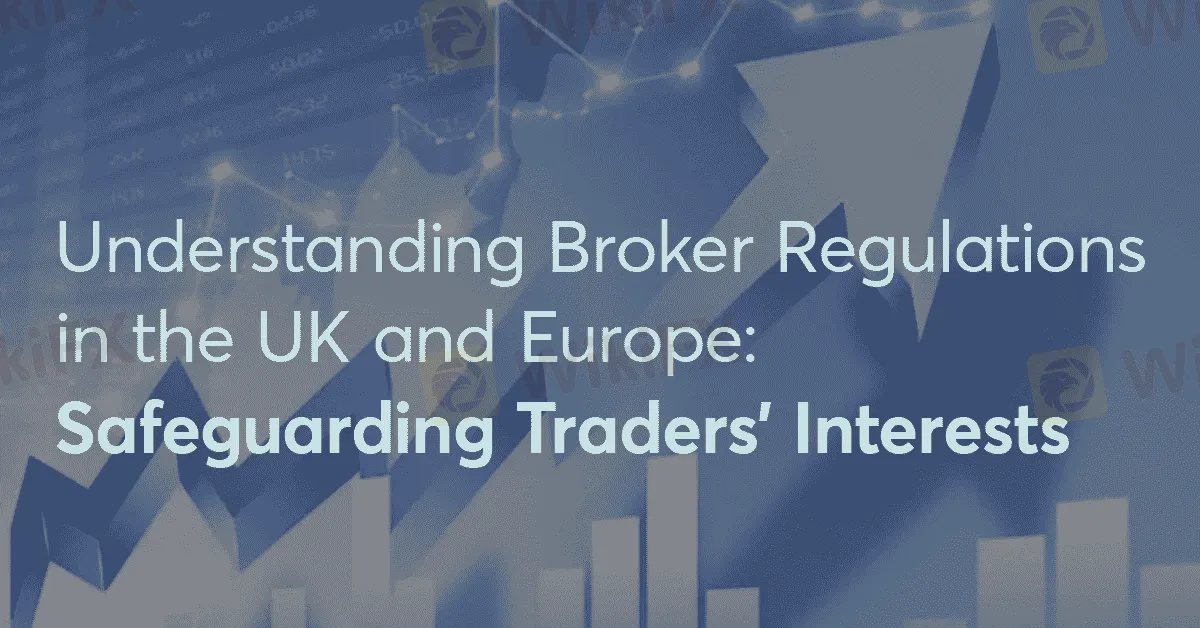简体中文
繁體中文
English
Pусский
日本語
ภาษาไทย
Tiếng Việt
Bahasa Indonesia
Español
हिन्दी
Filippiiniläinen
Français
Deutsch
Português
Türkçe
한국어
العربية
Understanding Broker Regulations in the UK and Europe: Safeguarding Traders' Interests
Abstract:In the dynamic world of Forex trading, regulatory frameworks serve as the bedrock of trust between traders and brokers. For traders in the UK and Europe, understanding the laws governing brokers is paramount. These regulations not only ensure ethical practices but also provide a sense of security, assuring traders that their investments are in safe hands. Here's a comprehensive overview of the laws around brokers in the UK and Europe.

In the dynamic world of Forex trading, regulatory frameworks serve as the bedrock of trust between traders and brokers. For traders in the UK and Europe, understanding the laws governing brokers is paramount. These regulations not only ensure ethical practices but also provide a sense of security, assuring traders that their investments are in safe hands. Here's a comprehensive overview of the laws around brokers in the UK and Europe.
United Kingdom (UK):
In the UK, Forex brokers are primarily regulated by the Financial Conduct Authority (FCA). The FCA is a renowned regulatory body known for its stringent standards and investor protection measures. Brokers operating in the UK must obtain FCA authorization, which involves rigorous scrutiny of their financial stability, operational integrity, and adherence to ethical practices.
One of the key aspects of FCA regulation is the Financial Services Compensation Scheme (FSCS). This scheme protects traders by compensating them up to £85,000 per person per institution if a regulated broker becomes insolvent. This safety net provides traders with a significant level of assurance, ensuring that even in adverse circumstances, their funds are protected.
Moreover, the FCA enforces strict rules regarding client fund segregation. Regulated brokers are required to keep clients' funds separate from their operational funds. This separation ensures that traders' money is not used for the broker's operational expenses, providing an additional layer of security.
European Union (EU):
In Europe, the regulatory landscape for Forex brokers underwent significant changes with the implementation of the Markets in Financial Instruments Directive (MiFID II). MiFID II is a comprehensive set of regulations designed to harmonize financial markets within the EU and enhance investor protection.
Under MiFID II, brokers must adhere to robust client protection measures, ensuring transparency and fairness in their dealings with traders. The directive mandates stringent risk disclosure requirements, ensuring that traders are fully aware of the risks associated with Forex trading before they engage with brokers. Brokers are obligated to provide detailed information about their services, fees, and potential conflicts of interest.
Additionally, MiFID II emphasizes best execution principles. This means that brokers must execute trades at the best possible terms for their clients, considering factors such as price, speed, likelihood of execution, and settlement size. These principles safeguard traders from unfair practices and price manipulations, fostering a level playing field in the market.
Post-Brexit Changes:
In the aftermath of Brexit, the UK established its own regulatory framework, maintaining its high standards of investor protection. Brokers operating in both the UK and Europe must navigate the complexities of dual regulations if they wish to provide services to traders in both regions. This duality underscores the importance of careful consideration and due diligence on the part of brokers and traders alike.
In conclusion, the laws around brokers in the UK and Europe are designed with the best interests of traders in mind. These regulations aim to create a transparent, secure, and fair trading environment. For traders, it is imperative to verify a broker's regulatory status before engaging in any trading activities. By choosing regulated brokers, traders not only protect their investments but also contribute to the overall integrity and stability of the Forex market, ensuring a safer trading experience for everyone involved.

Disclaimer:
The views in this article only represent the author's personal views, and do not constitute investment advice on this platform. This platform does not guarantee the accuracy, completeness and timeliness of the information in the article, and will not be liable for any loss caused by the use of or reliance on the information in the article.
Read more

FCA Identifies Clone Firm Exploiting Admiral Markets' Credibility
The UK Financial Conduct Authority (FCA) has issued a public warning regarding a fraudulent entity impersonating Admiral Markets, a legitimate and authorised trading firm. The clone firm, operating under the name Admiral EU Brokers and the domain Admiraleubrokerz.com, has been falsely presenting itself as an FCA-authorised business.

Malaysian Man Loses RM113,000 in Foreign Currency Investment Scam
A 57-year-old Malaysian man recently fell victim to a fraudulent foreign currency investment scheme, losing RM113,000 in the process. The case was reported to the Commercial Crime Investigation Division in Batu Pahat, which is now investigating the incident.

The Funded Trader: Reactivates Accounts with Revised Payout Structure
Proprietary trading firm The Funded Trader has detailed its financial recovery efforts following a turbulent period marked by an unsustainable payout model. Addressing these challenges publicly, the firm outlined the steps being taken to resolve outstanding obligations and ensure operational sustainability.

Doo Group Broadens Global Footprint with Indonesian Broker Acquisition
Doo Group has announced its acquisition of PT Prima Tangguharta Futures, a Jakarta-based broker specialising in online derivatives trading. This move represents a significant step in Doo Group's regional expansion strategy and reinforces its growing presence in Southeast Asia.
WikiFX Broker
Latest News
Webull Partners with Coinbase to Offer Crypto Futures
eToro Expands Nationwide Access with New York Launch
GCash, Government to Launch GBonds for Easy Investments
Why Is UK Inflation Rising Again Despite Recent Lows?
Hackers Charged for $11M Crypto Theft Using SIM-Swaps
Interactive Brokers Launches Tax-Friendly PEA Accounts in France
Google Warns of New Deepfake Scams and Crypto Fraud
Former Director Sentenced for Share Disclosure Breach
PayPal Expands PYUSD Use for Seamless Cross-Border Transfers
Trump Media in Talks to Acquire Crypto Firm Bakkt
Currency Calculator


